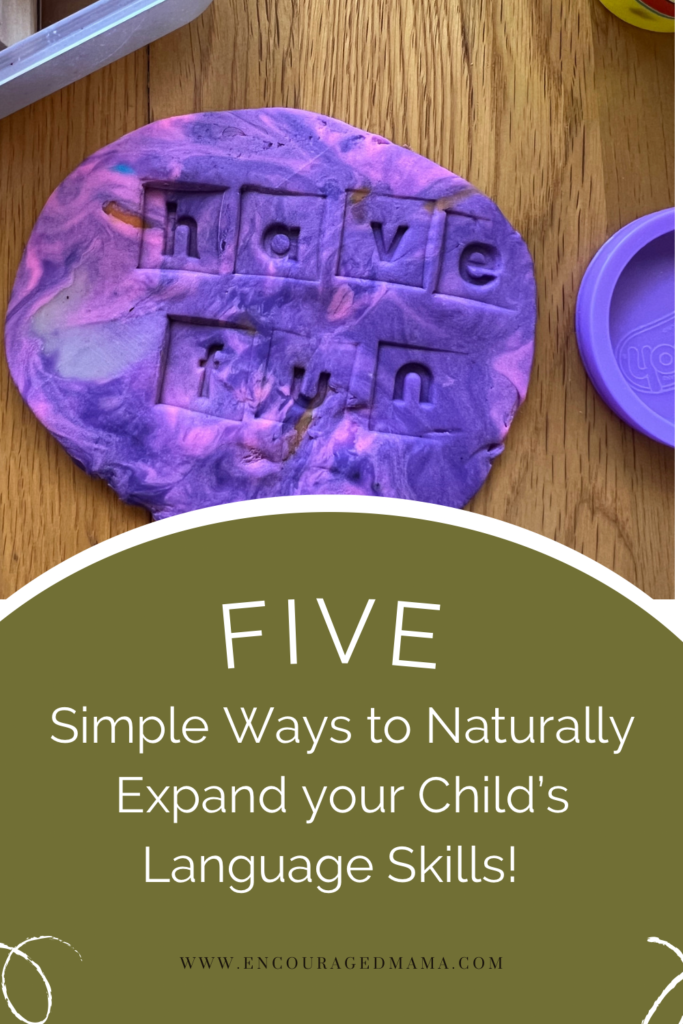5 Simple Ways to Naturally Expand a Child’s Language Skills

One of the things I love about being a mama is the hands-on approach I get to have in helping my child learn and grow. I’d be remiss if I said it didn’t have its hard moments, but there’s so much joy to be found in that intentional teaching. As a Speech-Language Pathologist I love to teach language development through natural everyday opportunities. Luckily those naturally go hand-in-hand. I wanted to share some easy ways you can help your child’s language development during your everyday activities and routines.
1. Reading- It is no secret that reading to your child is one of the best ways to build language and vocabulary. Just by reading a few books each day you are helping to expose them to thousands of words each year!!
Here is a tip to expand on that. When reading books with your child, talk about the pictures. Label what you see, the actions that are happening, anything that looks silly. Amazing discussions can be had in simply talking about the pictures from books! This is also a great way to get your child involved in the reading process!
2. Play- Have you heard the quote by Albert Einstein “Play is the highest form of research”?
Play opens up so many opportunities for language building! As you are playing with or next to your child, make observations out loud our about what they are doing :
“Wow, you are stacking those blocks high!”.
“I see you are matching the animals by species. Which animal should we choose next?”
“I see you are filling the dump truck with rocks. It sure looks like a heavy load! I hope the dump truck can carry it. What do you think?”
Talking about what they are doing will help to build their language skills and teach them the words to go along with their actions and ideas. It also gives them opportunities to share their knowledge and ideas with you. It is a great way for adults to engage with kids in their play in a fun and meaningful way and helps to foster connection at the same time!
3. Daily Routines- We all have daily routines we use throughout the day whether it is a morning routine, evening routine, mealtime routine, brushing teeth, etc. We have lots of routines we develop throughout our day for both ourselves and our children. Using these routines to build language skills is easy and will actually help to make the routine more effective.
Take the routine of brushing teeth as an example. Many kids are not fans of the toothbrushing process (I was one of them!). I have found that pairing an explanation with knowledge into these types of routines helps to foster an understanding and *sometimes* more willingness to participate.
Instead of just saying “we have to brush our teeth”. Try this: “We brush our teeth every morning and night to keep them clean and healthy. It is important to take take care of our body and our teeth are part of our body”. Adding those two simple sentences helps to build vocabulary and also teach concepts including health and wellness, reasoning, and self care. By using simple explanations like those into routines you are expanding your child’s knowledge and understanding to their daily functions and teaching or reinforcing core values as well!
4. Chores– Teaching children basic chores is an important life skill but let’s talk about how we can use those opportunities to build their language skills.
Now yes, teaching children to help with chores is a skill all of its own. There’s nothing that will teach a mama patience quite like training children in how to navigate the world of chores! But I am going to encourage you to dig a little deeper in that patience and try adding in some language building in the process (please don’t throw a shoe at me!) Here are a few ideas on how easy and simple this can be!
*Feeding the pets: “The dog bowl is empty, we need to fill it up” — simple right? But you are teaching the concepts of “empty” and “full” and allowing your child hands-on experience in how to change from one to the other. This would be perfect for toddlers in that 1-2 year old range.
*Making the bed: “The blankets are messy, we need to straighten them up so they are nice and cozy for bedtime tonight.”— again a simple statement that teaches the concept of messy/straightened while also providing a reasoning for chore. While making the bed you can also teach positional concepts of “over, under, on top, next to,”.
5. Mealtime- Mealtimes are another great opportunities to help build language skills in your child’s day. Typically they occur 3 times a day (more if you do snacks) which gives you many opportunities to naturally expose your child to vocabulary and concepts. Here are some of my favorite ways:
* Telling your child which meal you are eating and referencing it to a tune of day. “ It is time for breakfast. We eat breakfast in the morning”— this not only teaches the vocabulary but helps to pair it with a time reference. Young kids have a very hard time with the concept of time so by pairing the two together you are helping to start building understanding of those concepts!
* Talk about food! Tell your child each item on their plate and what food category it is in (fruits, vegetables, meat, treats). This helps to not only build their vocabulary but also helps them learn to categorize which is another important language skill! To add to this, talk about what color and shape the food is in its natural form (assuming some of the foods has to be cut up for the child) and how it tastes—sweet, sour, salty, savory. This teaches children how to describe items by different attributes which is another critical language skill.
If you have a picky eater, talking about food can help. The more information and general exposure kids have to a food the more apt they may be to try it!
There are many natural opportunities to build language skills throughout your child’s day. The best way to start is to just start talking! The more you talk to your child about different parts of the day the more natural it will come!
Have fun learning and building language together!
Alycia
